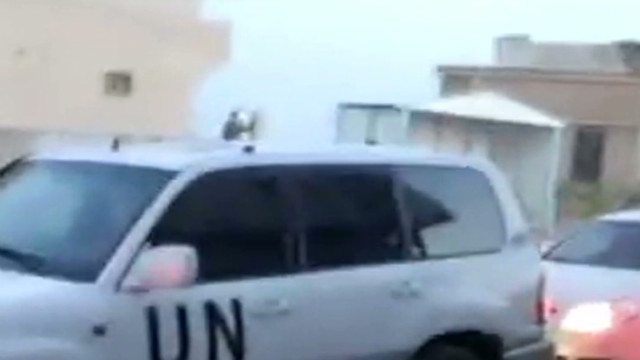
- Rights group documents executions, killings, arbitrary detention and torture
- Graffiti left in affected towns indicates it was a military operation, group says
- The report comes amid an international outcry over a cease-fire violation
- U.N. sends 24 observers into the nation, says it plans to send more
Are you there? Send us your images or video. Also, read this report in Arabic.
(CNN) -- As international envoy Kofi Annan negotiated a cease-fire in Syria, government forces raided opposition strongholds, killing and detaining residents in attacks amounting to war crimes, a rights group said Wednesday.
Government forces killed at least 95 people during the two-week offensive in Idlib shortly before the cease-fire, according to Human Rights Watch.
The attacks occurred in late March and early April as Annan was negotiating with the government to end the fighting, according to the group.
The cease-fire brokered by Annan went into effect April 12.
"While diplomats argued over details of Annan's peace plan, Syrian tanks and helicopters attacked one town in Idlib after another," said Anna Neistat, associate director for program and emergencies at Human Rights Watch.
"Everywhere we went, we saw burnt and destroyed houses, shops and cars, and heard from people whose relatives were killed. It was as if the Syrian government forces used every minute before the cease-fire to cause harm."
In the 38-page report, the rights group documents executions, killings, destruction of property, and arbitrary detention and torture.
About two-thirds of detainees remain in detention despite government promises to release political detainees, the group said.
The report is based on a field investigation in the towns of Taftanaz, Saraqeb, Sarmeen, Kelly, and Hazano in Idlib governorate.
"In each attack, government security forces used numerous tanks and helicopters, and then moved into the towns and stayed from one to three days before proceeding to the next town," Human Rights Watch said.
Graffiti left in affected towns indicated it was a military operation, according to the group.
"These cases indicate that government forces failed to distinguish between civilians and combatants and to take necessary precautionary measures to protect civilians," the rights group said.
The report comes amid an international outcry over a cease-fire violation by the government and opposition forces.
"All the parties need to take further steps to ensure a cessation of violence in all its forms," said Herve Ladsous, the U.N. under-secretary-general for peacekeeping, on Tuesday. "The people of Syria have suffered too much."
But the presence of the tiny but growing U.N. observer team is having a "dampening effect" on the violence, Ladsous said.
There are 24 unarmed military observers so far, he said, but the number is expected to go up in the next few weeks. The observers are in Homs, Hama, Daraa, Idlib and Damascus.
Human Rights Watch urged the United Nations to ensure its monitoring mission included a human rights staff to interview victims of abuses and protect them from retaliation.
"The peace plan efforts will be seriously undermined if abuses continue behind the observers' backs," Neistat said.
Meanwhile, violence raged.
Regime forces killed at least 48 people Tuesday, including 26 people in Idlib province, according to the Local Coordination Committees of Syria, a network of opposition activists.
CNN cannot independently verify reports of violence and deaths within Syria because the government has restricted access by most of the international media.
Syria's protests started peacefully in March last year, but a bloody government crackdown spawned violence that has left thousands dead and prompted some military defectors to take up arms against the regime forces.
The United Nations estimates that at least 9,000 people have died in the conflict while opposition groups put the death toll at more than 11,000.
Annan's peace plan calls for establishing a cease-fire between the government and the opposition, allowing humanitarian groups access to the population, releasing detainees and starting a political dialogue. It also calls for government forces to withdraw from city centers.
President Bashar al-Assad's family has ruled Syria for 42 years.
CNN's Ahmed Amir contributed to this report.



